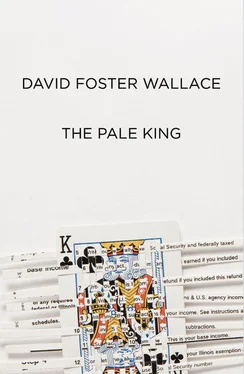Though it would be over a year before I understood them, here are just a few of the substitute’s review lecture’s main areas, as denumerated in the older business student’s notes:
Imputed Income → Haig-Simons Formula
Constructive Receipt
Limited Partnerships, Passive Losses
Amortization and Capitalization → 1976 TRA § 266
Depreciation → Class Life System
Cash Method v. Accrual Method → Implications for AGI
Inter vivos Gifts and 76 TRA
Straddle Techniques
4 Criteria for Nontaxable Exchange
Client Tax Planning Strategy (‘Tailoring the Transaction’) v. IRS Exams Strategy (‘Collapsing the Transaction’)
It was, as mentioned, the final regular class day of the term. The end of the final regular class, in the humanities courses I was used to taking, was usually the moment for the younger professor to try to make some kind of hip, self-mocking summation— ‘ Mr. Gorton, would you briefly summarize what we’ve learned over the past sixteen weeks, please?’ —as well as instructions about the logistics of the final exam or paper, and final grades, and perhaps wishes for a good holiday recess (it was two weeks before Christmas 1978). In Advanced Tax, though, when the substitute turned from raising the screen, he gave none of the bodily signals of completion or transition to final instructions or summary. He stood very still — noticeably stiller than most people stand when they stand still. Thus far, he had spoken 8,206 words, counting numeric terms and operators. The older males and Asians all still sat there, and it seemed that this instructor was able to make eye contact with all forty-eight of us at once. I was aware that part of this substitute’s vibe of dry, aloof, effortless authority was due to the way the class’s upperclassmen all paid such attention to his every word and gesture. It was obvious that they respected this substitute, and that it was a respect that he didn’t have to return, or feign returning, in order to accept. He was not anxious to ‘connect’ or be liked. But nor was he hostile or patronizing. What he seemed to be was ‘indifferent’ —not in a meaningless, drifting, nihilistic way, but rather in a secure, self-confident way. It’s hard to describe, although I remember the awareness of it very clearly. The word that kept arising in my mind as he looked at us and we all watched and waited — although all of this took place very quickly — was credibility, as in the phrase ‘credibility gap’ from the Watergate scandal, which had essentially been going on while I was at Lindenhurst. The sounds of other accounting, economics, and business administration classes emptying into the hallway were ignored. Instead of gathering together his materials, the substitute — who, as mentioned, I thought at the time was a Jesuit father in ‘mufti’ —had put his hands behind his back and paused, looking at us. The whites of his eyes were extremely white, the way usually only a dark complexion can make eyes’ whites look. I’ve forgotten the irises’ color. His complexion, though, was that of someone who had rarely been out in the sun. He seemed at home in thrifty, institutional fluorescent light. His bow tie was perfectly straight and flush even though it was the hand-tied kind, not a clip-on.
He said, ‘You will want something of a summation, then. An hortation.’ (It is not impossible that I misheard him and what he actually said was ‘exhortation.’ ) He looked quickly at his watch, making the same right-angled movement. ‘All right,’ he said. A small smile played around his mouth as he said ‘All right,’ but it was clear that he wasn’t joking or trying to slightly undercut what he was about to say, the way so many humanities profs of that era tended to mock themselves or their hortations in order to avoid seeming uncool. It only struck me later, after I’d entered the Service’s TAC, that this substitute was actually the first instructor I’d seen at any of the schools I’d drifted in and out of who seemed a hundred percent indifferent about being liked or seen as cool or likable by the students, and realized — I did, once I’d entered the Service — what a powerful quality this sort of indifference could be in an authority figure. Actually, in hindsight, the substitute may have been the first genuine authority figure I ever met, meaning a figure with genuine ‘authority’ instead of just the power to judge you or squeeze your shoes from their side of the generation gap, and I became aware for the first time that ‘authority’ was actually something real and authentic, that a real authority was not the same as a friend or someone who cared about you, but nevertheless could be good for you, and that the authority relation was not a ‘democratic’ or equal one and yet could have value for both sides, both people in the relation. I don’t think I’m explaining this very well — but it’s true that I did feel singled out, spindled on those eyes in a way I neither liked nor didn’t, but was certainly aware of. It was a certain kind of power that he exerted and that I was granting him, voluntarily. That respect was not the same as coercion, although it was a kind of power. It was all very strange. I also noticed that now he had his hands behind his back, in something like the ‘parade rest’ military position.
He said to the accounting students, ‘All right, then. Before you leave here to resume that crude approximation of a human life you have heretofore called a life, I will undertake to inform you of certain truths. I will then offer an opinion as to how you might most profitably view and respond to those truths.’ (I was immediately aware that he didn’t seem to be talking about the Advanced Tax final exam.) He said, ‘You will return to your homes and families for the holiday vacation and, in that festive interval before the last push of CPA examination study — trust me — you will hesitate, you will feel dread and doubt. This will be natural. You will, for what seems the first time, feel dread at your hometown chums’ sallies about accountancy as the career before you, you will read the approval in your parents’ smiles as an approval of your surrender — oh, I have been there, gentlemen; I know every cobble in the road you are walking. For the hour approaches. To begin, in that literally dreadful interval of looking down before the leap outward, to hear dolorous forecasts as to the sheer drudgery of the profession you are choosing, the lack of excitement or chance to shine on the athletic fields or ballroom floors of life heretofore.’ True, some of it I didn’t quite get — I don’t think too many of us in the classroom had spent a lot of time ‘shining on ballroom floors,’ but that might have been just a generational thing — he obviously meant it as a metaphor. I certainly got what he meant about accounting not seeming like a very exciting profession.
The substitute continued, ‘To experience commitment as the loss of options, a type of death, the death of childhood’s limitless possibility, of the flattery of choice without duress — this will happen, mark me. Childhood’s end. The first of many deaths. Hesitation is natural. Doubt is natural.’ He smiled slightly. ‘You might wish to recall, then, in three weeks’ time, should you be so disposed, this room, this moment, and the information I shall now relay to you.’ He was obviously not a very modest or diffident person. On the other hand, his form of address didn’t sound nearly as formal or fussy at the time in Advanced Tax as it now sounds when I repeat it — or rather his summation was formal and a bit poetic but not artificially so, like a natural extension of who and what he was. It was not a pose. I remember thinking that maybe the sub had mastered that trick in Uncle Sam posters and certain paintings of seeming to look right at you no matter what angle you faced him from. That perhaps all the hushed and solemn older other students (you could hear a pin) felt picked out and specifically addressed as well — though, of course, that would make no difference as to its special effect on me, which was the real issue, just as the Christian girlfriend’s story would have already demonstrated if I’d been aware and attentive enough to hear what the actual point she was trying to make was. As mentioned, the version of me that listened to that story in 1973 or ’74 was a nihilistic child.
Читать дальше












